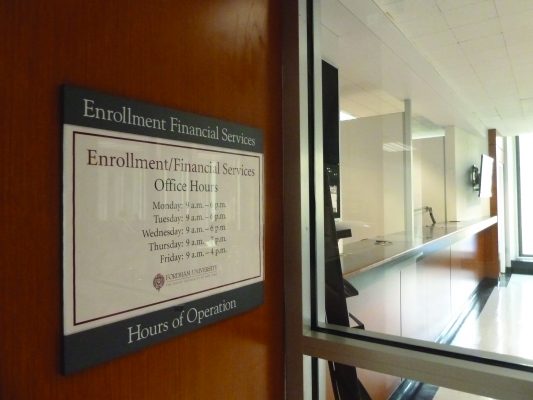Students in New York State Among Worst for Repaying Loans
Fordham’s tuition is comparable to those of other NYC universities. (PHOTO BY ELIZABETH LANDRY/THE OBSERVER)
May 5, 2016
On April 19, USA Today College published a list of the top 10 worst states for repaying student loans in 2016, on which New York placed ninth.
These rankings were determined by seven data points. Among those seven were the percentage of 2014 college graduates that had student debt, the median annual income for bachelor’s degree holders adjusted for the cost of living as of 2014 and the average growth rate for all jobs in a state considering the estimated number of annual job openings per capita from 2012 to 2022.
Among other statistics, the report states that 61 percent of New York’s 2014 college graduates left school with student debt. Angela Van Dekker, associate vice president of Fordham’s Student Financial Services, says that despite this statistic, “Fordham students have an admirable record of loan repayment.”
Seeing that Fordham’s tuition, including the mandatory fees for the 2015-2016 school year, is $47,317, many Fordham students do not find New York’s placement on the list surprising.
“[Fordham] is an expensive school, and I’m pretty sure it’s comparable to other schools in the city. Just like apartments and rentals, school in the city is expensive too,” Kyle McKee, Fordham College at Lincoln Center (FCLC) ’17, said.
In comparison to Fordham, New York University’s tuition, as of 2015 is $47,750 and Columbia University’s is $53,000.
To supplement the cost of tuition, roughly 90 percent of Fordham undergraduates receive financial aid, according to Van Dekker. These awards are given out, “based on need and/or merit [and] are determined by a number of factors including academic achievement, financial need, leadership, portfolio review and auditions where appropriate and other aspects of talent,” Van Dekker said.
Regardless of financial aid, Fordham’s tuition has some recent graduates questioning whether or not attending the University was the best decision for them financially.
“Although I was fortunate enough to have a job lined up directly after college, it’s been hard to really ‘start’ my life when I’m constantly stressing out about being able to repay my loans at the end of each month,” Laura Staravecka, FCLC ’15, said.
With that said, students like former United Student Government (USG) President Louise Lingat, FCLC ’15, feel that attending Fordham is worth the cost of tuition.
“Being involved on campus and representing the voices of the student body was more than what I saw myself doing when I first entered Fordham,” Lingat said. “I left Fordham not just with student debt, but with a more opened mind, a bigger heart and a greater desire to change the world, and for me, I would not have gotten that without Fordham.”
McKee echoes Lingat’s belief that attending Fordham is worth the cost. “Aside from location, the professors are amazing and everyone is truly an expert in their field,” McKee said. “When I look at the list of alumni that have attended school here, I know I chose the right place and realize that I’m getting a top-notch education.”
As for measures Fordham students can take to manage student loans, Staravecka sees many options. “Just being aware of what loans you’re taking out is a good start. Also try to start paying them back—the sooner the better,” said Staravecka. “I wish I would’ve split half my paycheck in undergrad and have at least a third go toward loan repayment.”
Van Dekker said that students need to be diligent about monitoring the loans they take from the beginning of their college careers. [quote_center]“Borrow only what you really need,” Van Dekker said. “Watch carefully how you are spending the money you have available to you. Borrow only what is absolutely necessary so that you minimize your debt in the future.”[/quote_center] “Borrow only what you really need,” Van Dekker said. “Watch carefully how you are spending the money you have available to you. Borrow only what is absolutely necessary so that you minimize your debt in the future.”
She added that Student Financial Services offers a “Financing your Fordham Education” reference guide to assist students in managing their student finances during their time at Fordham. “It includes guidance on how to plan for the four years and a page on comparing costs among the various colleges offering aid,” Van Dekker said. “We hope students will refer to it not just in freshman year, but whenever they need to.”









